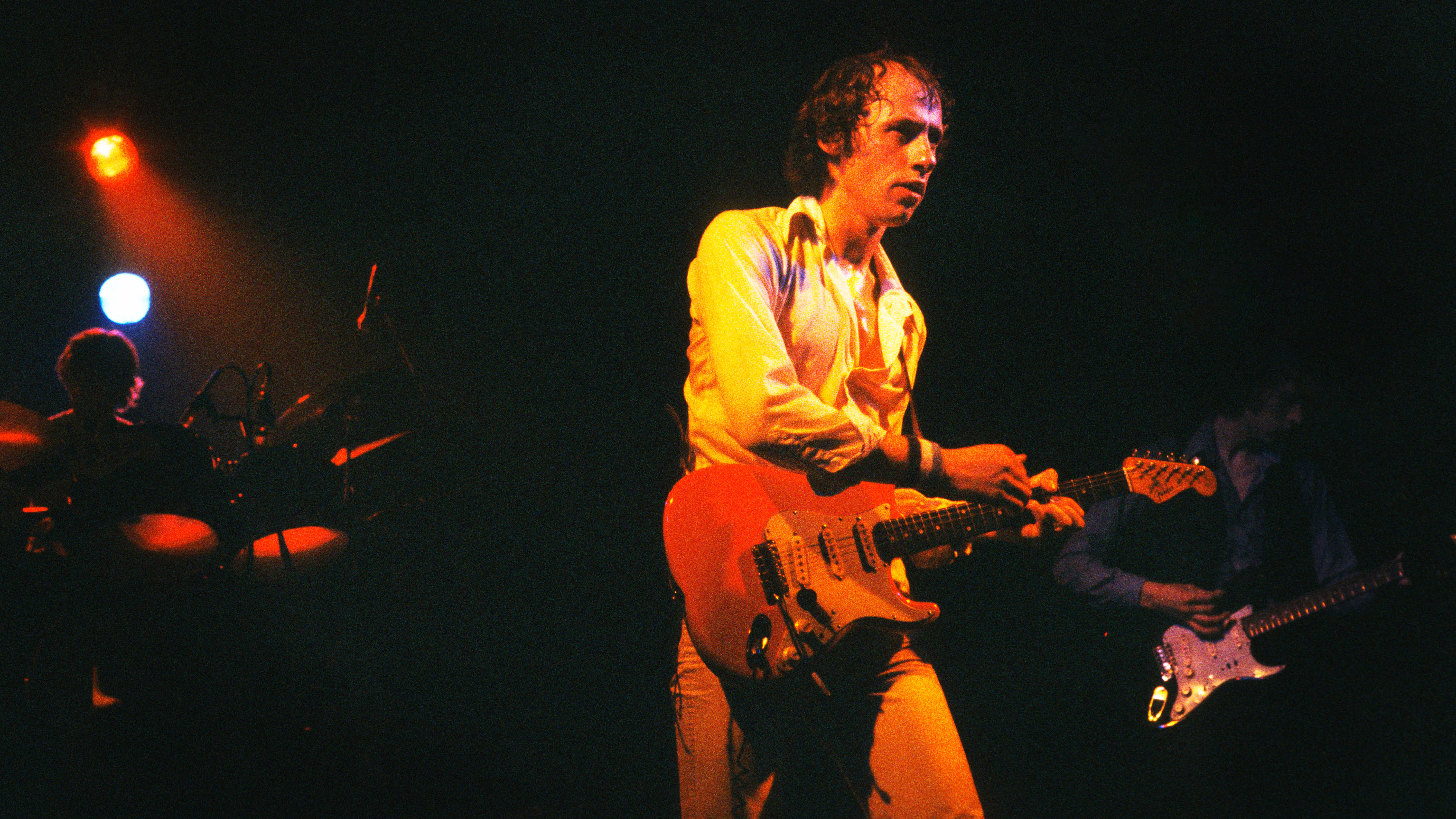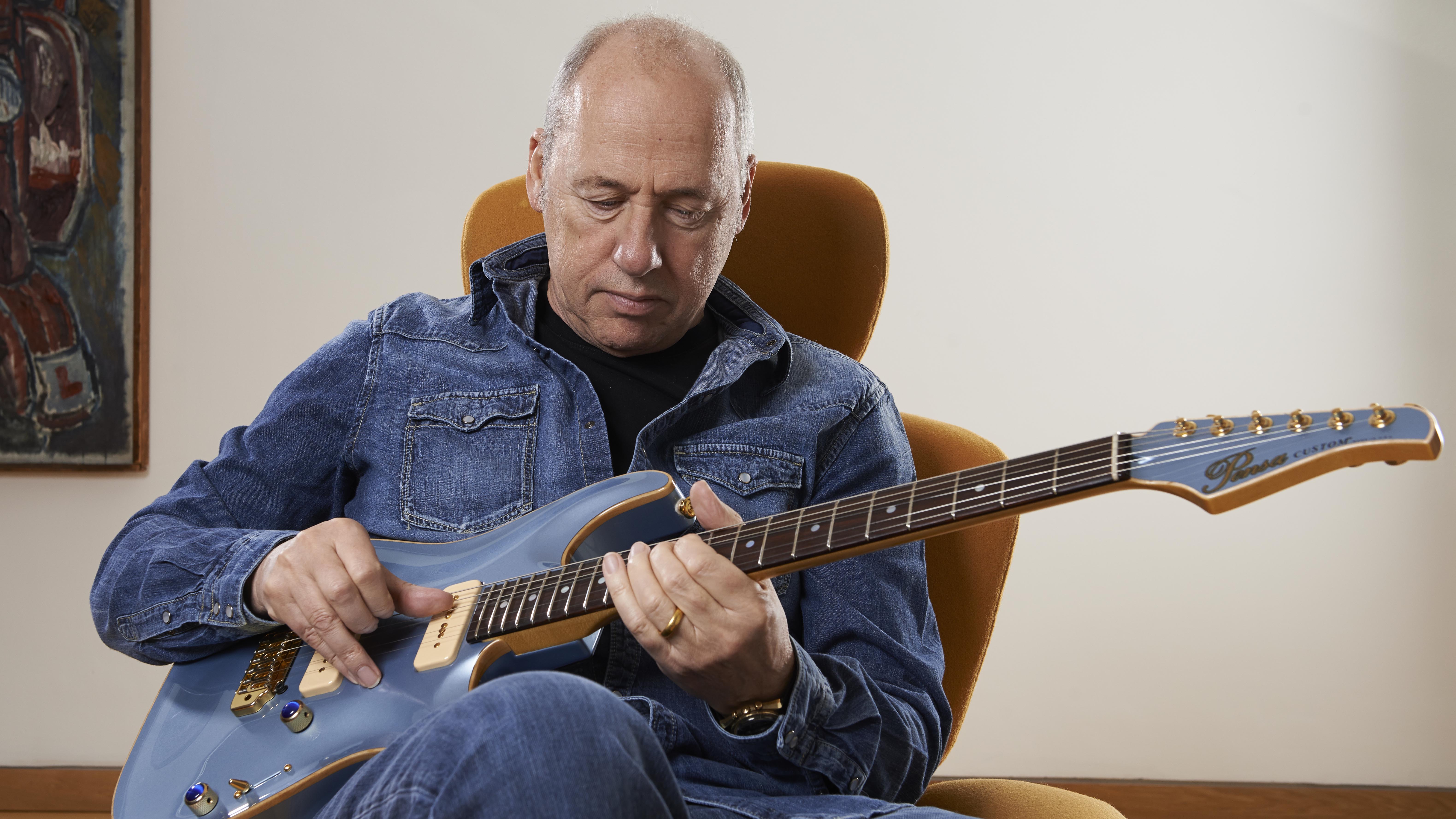"It’s not to do with gear, it’s all to do with the way the brain sends signals to his fingers – that’s what makes Mark so special": the story of the classic Dire Straits song that's often imitated, but rarely mastered
Producer Muff Winwood on a masterful Mark Knopfler track

Want all the hottest music and gear news, reviews, deals, features and more, direct to your inbox? Sign up here.
You are now subscribed
Your newsletter sign-up was successful
By the summer of 1977, Mark Knopfler had jacked in his job as an English lecturer in Essex and moved in with his guitarist brother, David. They lived with bassist John Illsley in a flat in Deptford, way down south, London town. One cold, rainy evening they stepped into a local pub where a group of old boys were playing Dixieland jazz music in the corner to the complete indifference of the patrons. Their set closed, and they signed themselves off as the Sultans Of Swing. The exotic majesty of their name clashed beautifully with the drab reality of their surroundings, and Mark Knopfler was inspired.
Back at the flat the lyrics came quickly, and the music was composed on his trusty National steel guitar. It was when he plugged his 1961 Strat into Illsley’s Fender Vibrolux amp that he knew he had something.
Honed over months of gigging at small venues from Deptford to Covent Garden, Sultans Of Swing was one of five songs Dire Straits recorded on their first demo. When that was picked up by legendary Radio London DJ Charlie Gillett, the phone began to ring.
I loved them and wanted to sign them, but I was too late – they’d already shaken hands on a deal with Phonogram for their Vertigo imprint
Manager Ed Bicknell recalls that A&R men were “leaping out of their baths” to sign them, and Muff Winwood was one of them. Formerly a member of The Spencer Davis Group with his brother Steve, he had become a talent scout and occasional producer for Island Records. “Someone tipped me off about this great band,” he recalled, “so I went to see them in Aylesbury. I loved them and wanted to sign them, but I was too late – they’d already shaken hands on a deal with Phonogram for their Vertigo imprint.”
Winwood was unaware that he happened to be top of the band’s list to produce their debut album. Island head Chris Blackwell consented, and so the band entered Island’s London studios in Basing Street in February 1978. “My first thought,” remembers Winwood, “was that I don’t have to change a lot or fiddle about.

They’d been playing Sultans live for a year or so, so they knew it inside out. Like all good bands they’d made all the mistakes, knew the good bits and chucked out the bad. John and Pick [Withers, Straits’ drummer], were a great rhythm section, so I concentrated on getting the bass guitar and bass drum locked in tight together. Mark took care of himself; you just had to say go and off he went.”
Through constant rehearsal and live performance, the left-handed Knopfler had built up what he called his “little store of licks”. Some had become part of the furniture of the song, such as the fleet-fingered arpeggios outlining the Dm, Bb and C in the outro. Despite the complexity of his technique, he has often claimed he didn’t really know what he was doing. He was just “doing his thing”. His parts on Sultans were played on his Strat, and while there’s no clear record of the amp, at the time he was gigging with a Music Man HD-130.
Want all the hottest music and gear news, reviews, deals, features and more, direct to your inbox? Sign up here.
“Every guitarist has his own sound,” says Winwood. “You start off with that, call him into the control booth and say, ‘We can do this to improve it’, then twiddle a knob and ask if that’s better. We got the guitar hire company to bring a pile of different amps and effects boxes in and dump them in the studio, and said, ‘Plug into that and see how that sounds’.”
I said, ‘You’ve got to be joking! You can’t put out a record about a trad band playing in a pub and expect it to sell!'
Preferring a sparse sound, Knopfler’s guitar was treated with just compression and reverb. Winwood contends that the sound comes from the man. “At the end of the day, what makes a piece of music get to your heart is the touch of the player. It’s human. If there weren’t any effects on there Mark would’ve made it sound brilliant. It’s not to do with gear, it’s all to do with the way the brain sends signals to his fingers. That’s what makes him so special.”
When the record company opted for Sultans as the lead single, Muff, for one, was incredulous. “I said, ‘You’ve got to be joking! You can’t put out a record about a trad band playing in a pub and expect it to sell!’”
But they did, that May. Radio 1 deemed it too wordy and declined to add it to their playlist – a crushing blow in those days. Although it faltered at home the song travelled well, becoming a hit first in Holland, then across the rest of Europe and as far as New Zealand.
With the album recorded, Winwood himself had moved on to CBS Records, to head up their A&R department. “But occasionally I’d meet Phonogram people who said, ‘You’d never guess, that Sultans Of Swing is getting played all over Holland, all over Germany’. Strangest of all, the Americans liked it, which I couldn’t believe! It was such an un-American song.”

Learn four guitar chords from Mark Knopfler and Dire Straits songs
Nevertheless, US radio did latch onto the song. Bicknell negotiated a deal with Warner Records, and Sultans Of Swing landed at No 4 on the Billboard Chart in early 1979. In a delicious twist, Radio 1’s Paul Gambaccini then played it on his weekly round-up of US Top 40 hits: the ‘over-wordy’ single finally made the UK’s biggest radio station. Re-released, it went Top 10, and Dire Straits became the best-selling UK debut album since Led Zeppelin.
Sultans would become Dire Straits’ signature anthem, making Mark Knopfler’s reputation as a world-class guitarist and pointing the way to the band’s incredible future success. “There was very little interest in them at first,” smiles Winwood, 33 years on. “Then all of a sudden it just went bang.”